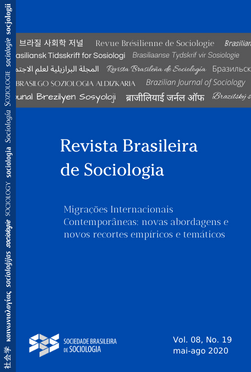Brazilian Foreign Policy for Immigrants and Refugees: New Concepts and Ethical Issues
Visualizações: 2616DOI:
https://doi.org/10.20336/rbs.563Resumo
In the last decades, Brazil has received about 2,1 million immigrants, according to the Federal Police. In this contingency, migration flows from Latin America, Caribbean and West African coast can be highlighted, represented respectively by Haitians, Cubans, Venezuelans, Bolivians, Senegalese and Ghanaians. Thus, this paper will discuss the role of Brazilian Foreign Policy, as a legal tool to coordinate Brazil’s immigration agenda and it aims to present the possibilities of the practical application of public policies for immigrants and refugees in the country based on the ethical challenges encountered by the Brazilian State and by the immigrants themselves, vis-à-vis to the foregoing context. Also, the paper will also present a brief immigration overview of Brazil, as well as launching for debate the concept of Brazilian Foreign Policy for Migrants and Refugees and its ethical challenges and delimitations in the Brazilian migration governance.
Downloads
Referências
AMORIM, Celso. (2017), Acting Globally: Memoirs of Brazil’s Assertive Foreign Policy.Lanham: Hamilton Books.
ARAÚJO, Carla; MONTEIRO, Tânia. Temer sanciona Lei da Migração com diversos vetos. 2017. Disponível em: https://brasil.estadao.com.br/noticias/geral,temer-sanciona-lei-da-migracao-com-diversos-vetos,70001812512. Acessoem: 22 abr. 2020.
CARDOSO, Fernando Henrique; FALETTO, Enzo. (1979), Dependency and Development in Latin America.Berkeley: UniversityofCalifornia Press.
HIRST, Monica; LIMA, Maria Regina Soares de; PINHEIRO, Leticia. (2010), “A política externa brasileira em tempos de novos horizontes e desafios”. Nueva Sociedad, número especial, pp. 22-41.
HOLANDA, Sérgio Buarque de (2012),Roots ofBrazil.Notre Dame: University of Notre Dame Press.
LOWE, Norman (2005), Mastering Modern World History.London: Palgrave Macmillan.
MOREIRA, Julia Bertino. (2015), “Política Externa e Refugiados no Brasil: uma análise sobre o governo Lula (2003-2010)”. Carta Internacional, v. 10, n. 3, pp. 133-151.
SANTOS, Milton. (2017),Toward an Other Globalization: From the Single Thought to Universal Conscience.Cham: Springer.
SARFATI, Gilberto. (2005),Teorias de relações internacionais. São Paulo: Saraiva.
SASSEN, Saskia. (2007), A Sociology of Globalization. Nova York: W. W. Norton & Company.
SEYFERTH, Giralda. (1999),“Os imigrantes e a campanha de nacionalização do Estado Novo”. In: PANDOLFI, Dulce (Ed.). Repensando o Estado Novo. Rio de Janeiro: Fundação Getulio Vargas.
THOMPSON, Charles D., Jr. (2017),Border Odyssey: Travels along the U.S./Mexico Divide. Austin: University of Texas Press.
UEBEL, Roberto Rodolfo Georg. (2017),“International Migrations to Brazil in the 21st Century: Profile, Outlook and Trends”. PopulationReview, v. 56, n. 1, pp.68-101.
UEBEL, Roberto Rodolfo Georg. (2018),Política Externa Migratória Brasileira: das Migrações de Perspectiva à Hiperdinamização das Migrações durante os Governos Lula da Silva e Dilma Rousseff. Tese de Doutorado. Universidade Federal do Rio Grande do Sul.
Downloads
Publicado
Como Citar
Edição
Seção
Licença
Autores que publicam nesta revista concordam com os seguintes termos:
- Autores mantêm os direitos autorais e concedem à revista o direito de primeira publicação, com o trabalho simultaneamente licenciado sob a Licença Creative Commons Attribution que permite o compartilhamento do trabalho com reconhecimento da autoria e publicação inicial nesta revista.
- Autores têm autorização para assumir contratos adicionais separadamente, para distribuição não-exclusiva da versão do trabalho publicada nesta revista (ex.: publicar em repositório institucional ou como capítulo de livro), com reconhecimento de autoria e publicação inicial nesta revista.
- Autores têm permissão e são estimulados a publicar e distribuir seu trabalho online (ex.: em repositórios institucionais ou na sua página pessoal) a qualquer ponto antes ou durante o processo editorial, já que isso pode gerar alterações produtivas, bem como aumentar o impacto e a citação do trabalho publicado (Veja O Efeito do Acesso Livre).
















